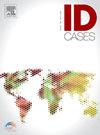Recurrent paradoxical reactions as non-communicating hydrocephalus and basal meningitis in a non-HIV patient with tuberculous meningitis and tuberculoma
IF 1.1
Q4 INFECTIOUS DISEASES
引用次数: 0
Abstract
Background
Tuberculosis meningitisis the most devastating form of Tuberculosis, causing high mortality or disability. Paradoxical neuro-inflammatory reactions, which occur despite appropriate anti-TB chemotherapy, may reflect the host response to dead and dying bacterial.
Case report
We report a case involving paradoxical reaction, effectively managed with emergent external ventricular drainage (EVD). The patient, a healthy 30-year-old Burmese woman, was diagnosed with disseminated tuberculosis involving pulmonary disease, vertebral osteomyelitis, and meningitis. Treatment included isoniazid (INH) 300 mg/day, rifampicin (RFP) 450 mg/day, ethambutol (EB) 750 mg/day, pyrazinamide (PZA) 1250 mg/day, levofloxacin (LVFX) 500 mg/day, and Dexamethasone (DEX) 0.4 mg/kg/day. A week after treatment initiation, she experienced the a paradoxical reaction but found relief with symptomatic treatment. Due to susceptibility of tuberculosis, we transitioned her to INH+RFP+LVFX, and DEXA was discontinued after two months. On day 66, she was readmitted with worsening symptoms and was diagnosed with a second paradoxical reaction and hydrocephalus. Neurosurgery inserted an EVD tube and resumed DEXA. The patient showed significant improvement, and the EVD was subsequently removed. DEXA was stopped after 4 months.There was no recurrence in one year.
Conclusion
During the treatment of TBM, a paradoxical reaction can occur at any time. Therefore, we recommend the necessity of collaborating with a neurosurgeon to facilitate emergency EVD drainage for the management of hydrocephalus.
复发性矛盾反应为非传染性脑积水和基底脑膜炎在非艾滋病患者结核性脑膜炎和结核瘤
结核病脑膜炎是最具破坏性的结核病形式,造成高死亡率或致残率。尽管适当的抗结核化疗仍会发生矛盾的神经炎症反应,这可能反映了宿主对死亡和垂死细菌的反应。病例报告我们报告一例涉及矛盾反应,有效地处理紧急心室外引流(EVD)。该患者为一名健康的30岁缅甸妇女,经诊断患有弥散性肺结核,包括肺部疾病、椎体骨髓炎和脑膜炎。治疗方法:异烟肼(INH) 300 mg/天,利福平(RFP) 450 mg/天,乙胺丁醇(EB) 750 mg/天,吡嗪酰胺(PZA) 1250 mg/天,左氧氟沙星(LVFX) 500 mg/天,地塞米松(DEX) 0.4 mg/kg/天。在治疗开始一周后,她经历了一种矛盾的反应,但在对症治疗后得到了缓解。由于肺结核易感,我们将其改为INH+RFP+LVFX,两个月后停用DEXA。第66天,患者因症状恶化再次入院,并被诊断为第二次矛盾反应和脑积水。神经外科插入EVD管并恢复DEXA。患者表现出明显的改善,随后EVD被移除。4个月后停用DEXA。1年内无复发。结论在TBM治疗过程中,随时可能发生矛盾反应。因此,我们建议有必要与神经外科医生合作,以促进紧急EVD引流治疗脑积水。
本文章由计算机程序翻译,如有差异,请以英文原文为准。
求助全文
约1分钟内获得全文
求助全文

 求助内容:
求助内容: 应助结果提醒方式:
应助结果提醒方式:


